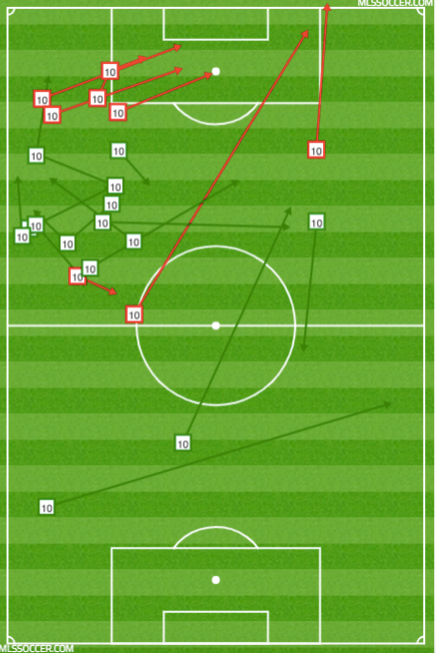Little Things from Week 31: Dallas’ Quiet Dominance & Villalba’s Tact
/By Harrison Hamm (@harrisonhamm21)
FC Dallas, slowing things down
I don’t know how one would go about measuring a soccer team’s pace of play. It’s possible, even easy, in basketball, where you can measure possessions per 48 minutes and generally find out how fast teams play. Soccer does not have the defined possessions of basketball; every possession is not created equal, so there’s no easy way to generalize them.
The better way to judge how quickly teams play with the ball in soccer — or, more specifically, how long they take to move the ball from point A to point Goal — is to consider the spots they fill. Many at ASA have done work with this. The question usually comes down to directness and chance-creation. Building from the back, counter-attacking, and pressing are the three modern tenets.
FC Dallas defy this specific type of analytics, as far as my statistics knowledge goes. They play at such a slow pace, and send so few numbers forward while not really bunkering, that it’s difficult to concretely identify their style of play.
Every Dallas game seems destined to become a stalemate, as though it’s designed exactly that way. It doesn’t matter the score — even the off 3-2 game feels a similar way. Only Columbus and Seattle have had fewer total goals scored in their games this year (Seattle’s 73 total goals in 30 games is remarkably low). Dallas’s 4-3 affair in San Jose — and the following week’s 4-2 win over Houston, both games coming against teams that can’t defend — skew their total.
It’s not that FCD’s attack is bad, even. In fact, it has the potential to be explosive:
Their first goal in Saturday’s 2-0 weather-marred win over Orlando City was pretty, with a clean buildup and a quality Santiago Mosquera finish. Putting Maxi Urruti in the “nine-and-a-half” position underneath Dominique Badji has sometimes worked out, and Urruti has seven assists in their last six games. Right back Reggie Cannon overlaps with ferocity.
They’re not having an obvious problem generating shots and chances. They’re third in the Western Conference with 14.3 shots per 96, and they’re middle of the pack across the board — sometimes even above average — in team xG numbers.
They attack with tentativeness, however, like Oscar Pareja is worried that his offense isn’t talented enough to throw players forward and risk a counter-attack. Whether they have the firepower to score on demand in the playoffs is an open question. There might not be a switch to flip — their attack looks like it has a defined ceiling.
Dallas are organized, well-coached and difficult to beat. They’re built to survive anywhere and everywhere in a league that verges on chaotic, which is how they quietly look likely to grab first in the Western Conference. The Sounders are somewhat similar, though much rockier and with a lower floor, higher-ceiling outlook.
I could see a scenario where FCD scrap out results and become the first ever No. 1 seed to make the MLS Cup final as a dark horse. I also could see them getting slightly unlucky or seeing one of their goalkeepers go haywire and bow out early in the playoffs. It could come down to creator Pablo Aranguiz, and their effective use of him.
Aranguiz has a respectable 12% touch percentage in the 209 minutes he’s played. (He played 56 on Saturday, but that has not been added to ASA’s database yet.) He rarely has opportunities on the ball in consequential areas, though, and while he has to be more active with his movement, he has been held back by Dallas’s restrictive system.
Look at his pass map from the Orlando game:
He played on the wing and barely drifted inside with any meaningful purpose. Aranguiz is massively talented and the natural replacement for Mauro Diaz’s creation, but he has to somehow be more involved. He could be the one to provide some electricity and aggressiveness to FC Dallas. They could use some.
The ultimate Atlanta United goal, and the value of Hector Villalba
Julian Gressel scored Atlanta’s second goal, which would prove to be the winner, in United’s 2-1 win against New England. It was a quintessential Atlanta play:
That Hector Villalba slip pass is low-key amazing — the timing on it had to be perfect, and Villalba placed it so that Gressel had the inside track from the start. It’s weighted to allow Gressel to hit it cleanly with his right foot. This is the definition of a perfect through-ball, from a player who excels in these situations.
Villalba is at his best when he’s facing the goal and the game is moving fast, and not just because he’s speedy himself; he has a good sense of the game when everything is in front of him and he has to think quickly. His creativity goes underappreciated in Atlanta’s attack. He isn’t a high-volume creator at the level of Miguel Almiron, but he is the ideal secondary producer.
He puts up numbers at an elite level. He has 20 goals and 20 assists in 55 MLS starts. He’s posting 1.53 key passes per 96, 0.67 xG+xA per game, and 3.34 shots per game, with most of his individual stats deferring to Almiron, Josef Martinez and even Gressel.
There’s also this, though:
Villalba is a very direct type of player — xB indicates a player’s involvement in their team’s possession, and it’s clear that Villalba is not that player. It will be interesting to see who carries that load in Almiron’s absence; Atlanta rely more on their No. 10 in possession than many teams in MLS.


